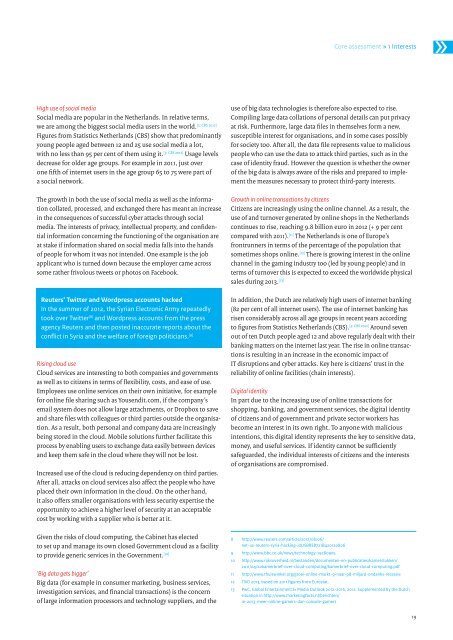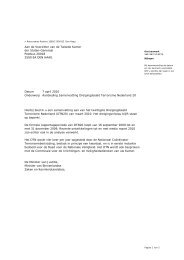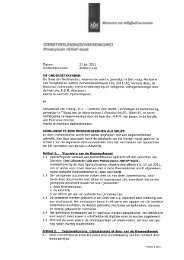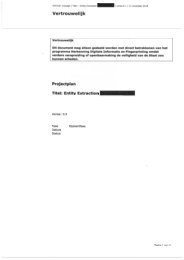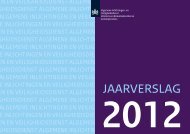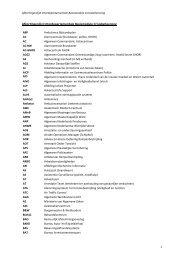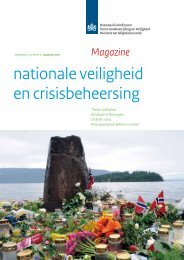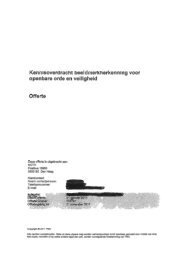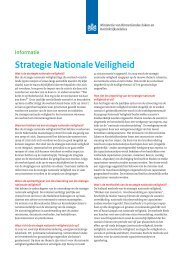third Cyber Security Assessment Netherlands - NCSC
third Cyber Security Assessment Netherlands - NCSC
third Cyber Security Assessment Netherlands - NCSC
You also want an ePaper? Increase the reach of your titles
YUMPU automatically turns print PDFs into web optimized ePapers that Google loves.
Core assessment » 1 Interests<br />
»<br />
»»»»»<br />
High use of social media<br />
Social media are popular in the <strong>Netherlands</strong>. In relative terms,<br />
[3: CBS 2012]<br />
we are among the biggest social media users in the world.<br />
Figures from Statistics <strong>Netherlands</strong> (CBS) show that predominantly<br />
young people aged between 12 and 25 use social media a lot,<br />
with no less than 95 per cent of them using it. [3: CBS 2012] Usage levels<br />
decrease for older age groups. For example in 2011, just over<br />
one fifth of internet users in the age group 65 to 75 were part of<br />
a social network.<br />
The growth in both the use of social media as well as the information<br />
collated, processed, and exchanged there has meant an increase<br />
in the consequences of successful cyber attacks through social<br />
media. The interests of privacy, intellectual property, and confidential<br />
information concerning the functioning of the organisation are<br />
at stake if information shared on social media falls into the hands<br />
of people for whom it was not intended. One example is the job<br />
applicant who is turned down because the employer came across<br />
some rather frivolous tweets or photos on Facebook.<br />
Reuters’ Twitter and Wordpress accounts hacked<br />
In the summer of 2012, the Syrian Electronic Army repeatedly<br />
took over Twitter [8] and Wordpress accounts from the press<br />
agency Reuters and then posted inaccurate reports about the<br />
conflict in Syria and the welfare of foreign politicians. [9]<br />
Rising cloud use<br />
Cloud services are interesting to both companies and governments<br />
as well as to citizens in terms of flexibility, costs, and ease of use.<br />
Employees use online services on their own initiative, for example<br />
for online file sharing such as Yousendit.com, if the company’s<br />
email system does not allow large attachments, or Dropbox to save<br />
and share files with colleagues or <strong>third</strong> parties outside the organisation.<br />
As a result, both personal and company data are increasingly<br />
being stored in the cloud. Mobile solutions further facilitate this<br />
process by enabling users to exchange data easily between devices<br />
and keep them safe in the cloud where they will not be lost.<br />
Increased use of the cloud is reducing dependency on <strong>third</strong> parties.<br />
After all, attacks on cloud services also affect the people who have<br />
placed their own information in the cloud. On the other hand,<br />
it also offers smaller organisations with less security expertise the<br />
opportunity to achieve a higher level of security at an acceptable<br />
cost by working with a supplier who is better at it.<br />
Given the risks of cloud computing, the Cabinet has elected<br />
to set up and manage its own closed Government cloud as a facility<br />
to provide generic services in the Government. [10]<br />
‘Big data gets bigger’<br />
Big data (for example in consumer marketing, business services,<br />
investigation services, and financial transactions) is the concern<br />
of large information processors and technology suppliers, and the<br />
use of big data technologies is therefore also expected to rise.<br />
Compiling large data collations of personal details can put privacy<br />
at risk. Furthermore, large data files in themselves form a new,<br />
susceptible interest for organisations, and in some cases possibly<br />
for society too. After all, the data file represents value to malicious<br />
people who can use the data to attack <strong>third</strong> parties, such as in the<br />
case of identity fraud. However the question is whether the owner<br />
of the big data is always aware of the risks and prepared to implement<br />
the measures necessary to protect <strong>third</strong>-party interests.<br />
Growth in online transactions by citizens<br />
Citizens are increasingly using the online channel. As a result, the<br />
use of and turnover generated by online shops in the <strong>Netherlands</strong><br />
continues to rise, reaching 9.8 billion euro in 2012 (+ 9 per cent<br />
compared with 2011). [11] The <strong>Netherlands</strong> is one of Europe’s<br />
frontrunners in terms of the percentage of the population that<br />
sometimes shops online. [12] There is growing interest in the online<br />
channel in the gaming industry too (led by young people) and in<br />
terms of turnover this is expected to exceed the worldwide physical<br />
sales during 2013. [13]<br />
In addition, the Dutch are relatively high users of internet banking<br />
(82 per cent of all internet users). The use of internet banking has<br />
risen considerably across all age groups in recent years according<br />
to figures from Statistics <strong>Netherlands</strong> (CBS). [3: CBS 2012] Around seven<br />
out of ten Dutch people aged 12 and above regularly dealt with their<br />
banking matters on the internet last year. The rise in online transactions<br />
is resulting in an increase in the economic impact of<br />
IT disruptions and cyber attacks. Key here is citizens’ trust in the<br />
reliability of online facilities (chain interests).<br />
Digital identity<br />
In part due to the increasing use of online transactions for<br />
shopping, banking, and government services, the digital identity<br />
of citizens and of government and private sector workers has<br />
become an interest in its own right. To anyone with malicious<br />
intentions, this digital identity represents the key to sensitive data,<br />
money, and useful services. If identity cannot be sufficiently<br />
safeguarded, the individual interests of citizens and the interests<br />
of organisations are compromised.<br />
8 http://www.reuters.com/article/2012/08/06/<br />
net-us-reuters-syria-hacking-idUSBRE8721B420120806<br />
9 http://www.bbc.co.uk/news/technology-19280905<br />
10 http://www.rijksoverheid.nl/bestanden/documenten-en-publicaties/kamerstukken/<br />
2011/04/20kamerbrief-over-cloud-computing/kamerbrief-over-cloud-computing.pdf<br />
11 http://www.thuiswinkel.org/groei-online-markt-9-naar-98-miljard-ondanks-recessie<br />
12 TNO 2013, based on 2011 figures from Eurostat.<br />
13 PwC, Global Entertainment & Media Outlook 2012-2016, 2012. Supplemented by the Dutch<br />
situation in http://www.marketingfacts.nl/berichten/<br />
in-2013-meer-online-gamers-dan-console-gamers<br />
19


